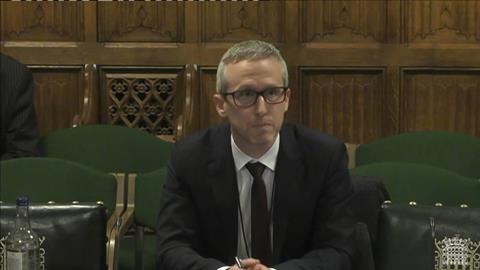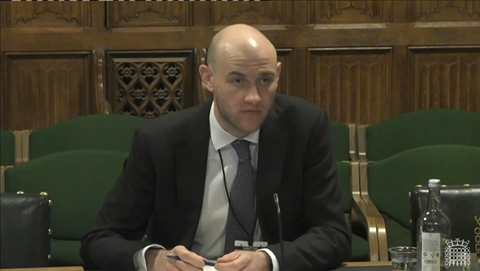Ballymore boss says the withdrawal of the Consolidated Advice Note set to significantly reduce scope of works
Developer Ballymore has said the government’s withdrawal of its previous fire safety advice to building owners last month is likely to “fundamentally” reduce the cost of repair work it is undertaking on its buildings.

The group MD of Ballymore John Mulryan (pictured, left) told MPs on the housing select committee that the initial view of fire engineers consulted by the firm was that the withdrawal of the government’s Consolidated Advice Note (CAN) and its replacement with new guidance from the BSI will significantly reduce the scope of necessary works.
The CAN had been widely viewed as a major factor in causing lenders and insurers to require detailed fire assessments and subsequent remediation work before supporting sales of flats in affected blocks.
However, the announcement last month by housing secretary Michael Gove of the withdrawal of the CAN and the publishing of the BSI’s new PAS 9980 guidance, while widely welcomed by the industry, was also met with concerns that it will not immediately fix the logjam in buying and selling homes.
But Mulryan, speaking on Monday, told the committee that the new PAS could make a “fundamental” difference to the extent and cost of repairs on 20 Ballymore blocks affected by the fire safety crisis, though he said the firm was still weeks away from putting a precise figure on the impact.
He said: “The significance of the withdrawal of the advice notes, I think, is actually quite fundamental.”
While he admitted there was a possibility it could delay in the commencement of some of the works because of a need to make a new assessment, he said “the reality is it could also accelerate the completion of works, because, […] the scope of the works on some of these buildings will materially change on the back of the withdrawal of the advice note.”
He added: “Even though there are some details to be worked out, this will mean that a huge amount of work that would have been carried out, that was probably unnecessary, now won’t be carried out and we can use the funding that we have available where’s it’s really needed.
“We think that is a is a very important step and it could have a big impact on how we resolve these issues sooner.”
>> Can Gove really ‘go after’ developers for £4bn of cladding costs?
>> When will the flat valuation blockage finally come to an end?

His comments were also echoed by David O’Leary, policy director at the Home Builders Federation (pictured, right), who said the housebuilder trade body welcomed the shift in guidance. He said: “I think the return to something approaching what the secretary of state calls a common sense approach is positive and it will have hopefully have the impact we need. But it’s vital that the RICS, surveyors, lenders, and everyone else is also part of that conversation.”
The comments to the Levelling Up, Housing and Communities Select Committee on the change in guidance came as part of an evidence session in which the HBF called on the government to ensure the estimated £4bn cost of fire safety repairs to mid-rise buildings was spread across the industry. David O’Leary said the body was working with the government to draw up figures on the exact cost of the work and determine responsibility for the affected homes.
Ballymore’s Mulryan was in the session also forced by MPs to promise that the developer will address within two weeks alleged problems suffered by residents of its New Providence Wharf development, which is currently undergoing repair.











No comments yet